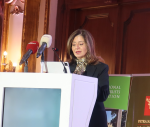You are here
Threatening summit
Mar 11,2014 - Last updated at Mar 11,2014
The emir of Kuwait, Sheikh Sabah Al Ahmad Al Jaber Al Sabah, who is recovering from surgery and had to cut short his stay in the United States, will be hosting one of the toughest Arab League summits in recent history.
The summit, which will be held in Kuwait on March 25, will be shadowed by fresh political disputes among member states, in addition to pressing issues such as the Syrian crisis and the peace process in Palestine.
Bitter accusations by Saudi Arabia, the United Arab Emirates and Bahrain against Qatar reached the climax when the three Gulf states recalled their ambassadors from Doha.
The dispute is the most serious challenge to the Gulf Cooperation Council (GCC) since its inception in 1981.
Member states had always managed to resolve their differences internally, without threatening the integrity of the GCC.
The tripartite move, following a heated meeting of Gulf foreign ministers in Riyadh last week, underlines the level of anger and frustration with Qatar’s unilateral and controversial policies both within the Gulf area and across the region.
It is also the biggest test yet to the rule of Qatar’s young Emir Sheikh Tamim Bin Hamad Al Thani, who took over from his father last year.
The three states, in a joint statement, accused Doha of breaking commitments it had signed during a meeting in Riyadh last November of the leaders of Saudi Arabia, Kuwait and Qatar.
High among these commitments is the respect for the principle of non-interference in the affairs of other states.
Among others, Doha is accused of meddling in the affairs of Saudi Arabia, the UAE and Bahrain, in addition to hosting or supporting opponents of these countries.
In particular, Qatar has been criticised for waging a media campaign against the new regime in Egypt and of supporting the Muslim Brotherhood there.
The three countries vowed to adopt further measures if Doha does not alter its policies. So far, the Qatari position has been unrelenting and officials were quoted as saying that Doha will not budge under pressure.
All eyes are now on the emir of Kuwait, who had mediated before, to intervene once more and try to mend the rift before the convening of the Arab summit in his capital city later this month.
The Saudi position was bolstered when the government declared that it was labelling the Muslim Brotherhood and others, including Jabhat Al Nusra and the Islamic State in Iraq and the Levant, as terrorist organisations and warned against any promotion of their activities on radio, TV and social networks.
Those who do so face criminal charges.
In recent weeks, Riyadh toughened its position on terrorism under the guise of Islam and on fatwas encouraging people to fight in Syria.
It is not clear if Kuwait’s mediation efforts will succeed in repairing the rift. Historically, and since the middle of the 1990s, Qatar had chosen to follow controversial foreign policies that infuriated its GCC colleagues, especially Saudi Arabia.
Qatar never really adhered to a common GCC foreign policy. Such unilateral approach was apparent in its relationship with Iran, Hizbollah, Hamas and Israel.
The Qatari-owned Al Jazeera channel had angered many governments, both Arab and foreign, because of its contentious coverage of conflicts and by inviting key opposition figures to appear on its talk shows. Al Jazeera soured Qatar’s relations with most GCC members before, and its offices were often closed and its correspondents banned.
But now, Saudi Arabia believes that Qatari policies and actions are weakening both the GCC and key Arab countries such as Egypt, which is trying to hold presidential and legislative elections and conclude a political roadmap that began with the overthrow of president Mohamed Morsi last July.
Qatar and its media arm played a major role in supporting popular uprisings in Tunisia, Libya, Egypt, Yemen and Syria.
But in the view of critics, the Qatari intervention and its support for the Muslim Brotherhood Movement destabilised these countries.
One question that comes to mind is: Will the Qataris ever accept to be ruled by the Muslim Brotherhood, which their government blindly supports elsewhere?
Ironically, both Saudi Arabia and Qatar, who are at odds over Egypt, are major supporters of the Syrian opposition, which includes Syria’s Muslim Brotherhood.
How the current standoff between the two GCC members, and recent Saudi moves against the Muslim Brotherhood Movement, will affect the future of the Syrian uprising remains to be seen.
The two Gulf state have also been accused by Iraqi Prime Minister Nouri Al Maliki of “declaring war” on Iraq by supporting what he described as terrorist groups, an accusation that both Riyadh and Doha rejected. This recent development will also feature in the upcoming summit in Kuwait.
The ongoing Gulf dispute will weaken the chances for a successful Arab summit.
It will also overshadow other urgent matters such as the future of the Syrian crisis and the repercussions of a new peace deal between Israel and the Palestinians.
If mediation efforts between Qatar and its neighbours fail, the summit will be remembered for deepening Arab divisions and exposing higher national interests to further regional danger.
The writer is a journalist and political commentator based in Amman.












